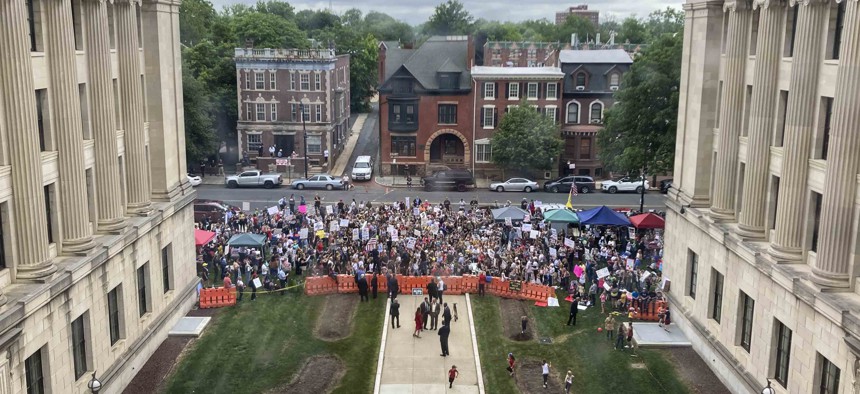The States With New Restrictions on Public Health Emergency Powers

Rallygoers carry signs that say "Unmask our kids" and chanting "kill the bill," opposing a bill that would end the public health emergency stemming from the COVID-19 outbreak, Thursday, June 3, 2021, in Trenton, N.J. AP Photo/Mike Catalini
A new research project tracks and maps laws limiting how governors and others can respond to crises like the pandemic.
Lawmakers in at least 10 states pushed through legislation this year to curtail the authority governors have in issuing orders in response to public health emergencies, according to newly released data.
Temple University's Center for Public Health Law Research compiled the information, which also shows that legislators in 46 states introduced bills along these lines between Jan. 1 and June 17. The findings offer a window into how backlash over public health directives during the Covid-19 pandemic in some cases fueled lawmaking efforts aimed at curbing executive power.
States where laws were enacted between January and June to limit governors' authority around public health emergency orders, according to the data, include: Arkansas, Idaho, Kansas, Kentucky, Montana, New Jersey, New York, North Dakota, Tennessee and Utah.
Some ways that the laws rein in that authority include limiting the duration of emergency orders, stipulating that the orders may be ended by the legislature, or restricting the scope of the mandates.
The data the researchers assembled also shows which states imposed new limits on the power that state and local officials other than governors have to issue emergency public health directives.
“Our concern with these laws is that they may greatly hobble state and local officials’ ability to respond to an emergency like the Covid-19 pandemic in a swift and flexible way," Katie Moran-McCabe, special projects manager at the Center for Public Health Law Research and lead researcher on the project, said in a statement.
"Evaluation will help us better understand that impact," she added.
To track and map emerging laws affecting public health, the center says it's using a new method known as "sentinel surveillance of emerging laws and policies." The goal with this process is to quickly produce datasets that help to shed light on the latest public health lawmaking and policy trends.
The Association of State and Territorial Health Officials provided research for the project and funding came from the Robert Wood Johnson Foundation. There are plans to update the dataset in November with laws enacted since June.
Bill Lucia is a senior editor for Route Fifty and is based in Olympia, Washington.
NEXT STORY: Leveraging State and Local Buying Power to Improve Resilience and Sustainability






